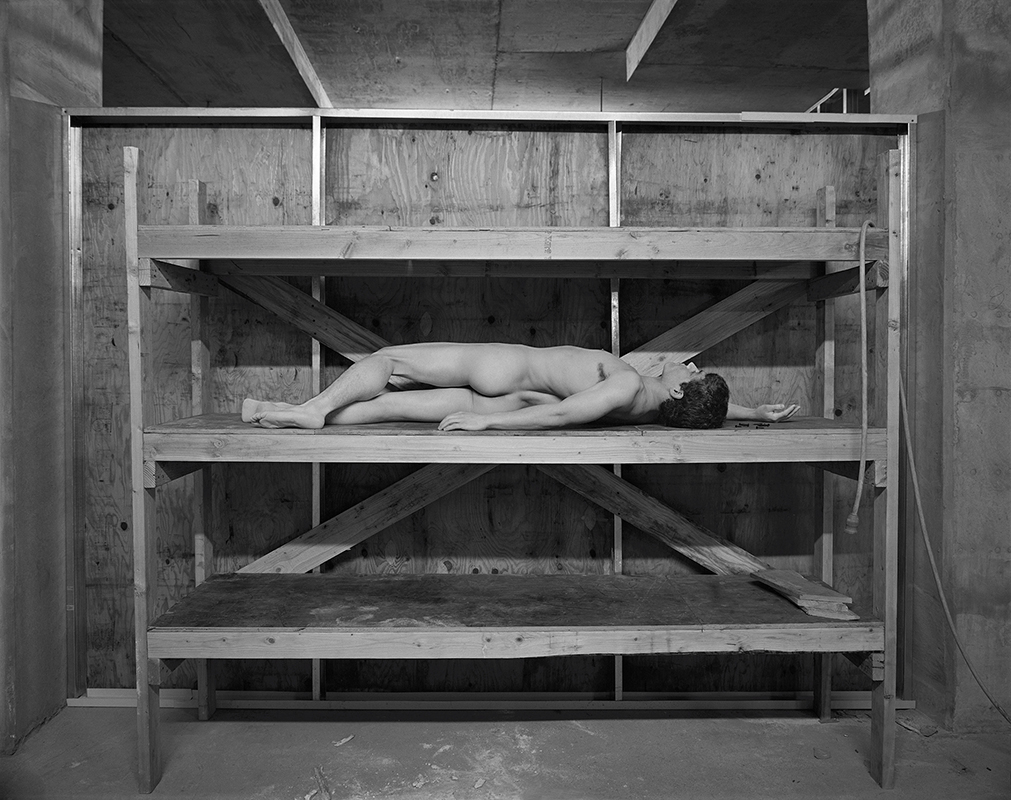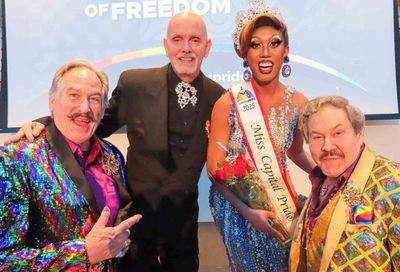Buck Off!
Riding hard and wild at the Atlantic Stampede Rodeo
These are the sounds of a rodeo: Thumping hooves. Stomping feet. Snorting bulls. Yee-haw cowboys. Twangy guitars. Clapping hands. Clicking heels.
Clicking heels?
Well, we are talking gay rodeo here. Heels are bound to come into play somewhere, and we’re not just talking boot heels. In this case, they come into play as part of something called Wild Drag, but we’ll get back to that in a minute.
First, what you need to know is that the 2004 Atlantic Stampede Rodeo is setting up shop this weekend in Maryland at the Montgomery Country Agricultural Center and Fairgrounds. Organized by the Atlantic States Gay Rodeo Association (ASGRA), the Stampede has grown since 1991 into one of the largest and brightest stops on the ever-burgeoning gay rodeo circuit. Based on past experience and pre-sales, ASGRA expects to sell around 3,000 single tickets for the course of the weekend.
|
It’s a weekend for the both the country-western curious and the country-western experienced.
J.R. Key, ASGRA public relations chair, comes from the “experienced” crowd. He grew up in rural North Carolina where listening to country music was a way of life. When he came to D.C., he says, “That was really my tie-in [to the community]. I started going to Remingtons for country-western dancing.”
During those first years in town, he also jumped at the opportunity to volunteer for the annual Atlantic Stampede so he could get a weekend pass for the event. The grew into joining a committee, and now he’s spent the past three years serving on the ASGRA board.
“You volunteer because you’re interested,” Key says. “And then it’s really hard to stop, because of how much they need volunteers.”
For those unfamiliar with gay rodeos, or rodeos in general, it may be a bit surprising how serious the competition is at the Stampede. All the traditional rodeo events you know of — bull riding, chute dogging, calf roping — are as big a part of gay rodeo as any non-gay rodeo.
And that includes all the painful-looking falls, throws and spills.
“There’s rarely a rodeo that happens that someone doesn’t get some kind of injury, fracture or [muscle] tear,” says Key. “Accidents happened, and some of them are serious.
“But it’s very rare that you hear of any type of fatal injury. Most things people get up and walk away from, and as soon as they’re healed, they’re right back.”
|
Key himself has incurred a number of injuries, including a fractured ankle and a torn tendon that precludes him from competing in this year’s Stampede. Although, he allows, he may still venture a try at calf roping.
“People wonder, ‘What possesses you?'” he says. “But the reality is that you can get injured in any sport.”
Although injuries are something that gay rodeo shares with its non-gay counterparts, there is something that the Stampede has that you won’t see watching rodeos on ESPN.
And that’s where those heels come into play.
The “camp events” allow competitors to get involved in the arena in ways that don’t require the same skills as the traditional rodeo events. But that doesn’t mean you’ll only see newcomers and amateurs trying to put underwear on a goat in the goat-dressing competition.
A lot of those serious competitors like their share of camp as well, Key says.
One of the most well-known of the camp events is the Wild Drag race, in which teams of three — one man, one woman, and one person in drag — work to maneuver a steer across a line in the arena and back. Definitely a gay twist on the Marlboro man ethos, but it’s a deceptively difficult one.
“Most injuries occur during wild drag,” says Key, pointing out that the “wild” appellation is appropriately used. “It’s a little bit of mayhem and madness — the person trying to ride the steer may bet bucked off several times.
“It’s the wildest in terms of funny to watch, but it also can be the wildest [competition] in the arena.”
The arena isn’t the only place to catch some country-western and rodeo vibes at the Stampede. At the rodeo grounds, you’ll find large vendor and entertainment area, where you can buy yourself some boots and belt buckles, then head out to the dance floor for some two-stepping and line dancing.
Key says the fairgrounds are “not a carnival, but it’s a festival atmosphere.”
“There are lots of people hanging out by the beer truck,” he laughs. “It’s a way to take a break from the sun for a little while to cool off.”
 |
For many, Stampede weekend is less about heading out to the rodeo and more about heading out to the dance floor. Over the course of the weekend, those folks can give their legs a workout dancing the night away at the Hyatt Regency Washington’s ballroom — plus catch performances from the D.C. Cowboys, the Manhattan Prairie Dogs, and others.
“It depends on what interests them most,” Key says. “If they’re really there for dancing the host hotel events are fantastic.”
So break out your broken-in boots and your best-worn jeans. It’s the weekend to be the cowboy or cowgirl you always wanted to be. And even, if you feel like it, a little bit of both.
For more information on ASGRA and the Atlantic Stampede, visit www.asgra.org.
Support Metro Weekly’s Journalism
These are challenging times for news organizations. And yet it’s crucial we stay active and provide vital resources and information to both our local readers and the world. So won’t you please take a moment and consider supporting Metro Weekly with a membership? For as little as $5 a month, you can help ensure Metro Weekly magazine and MetroWeekly.com remain free, viable resources as we provide the best, most diverse, culturally-resonant LGBTQ coverage in both the D.C. region and around the world. Memberships come with exclusive perks and discounts, your own personal digital delivery of each week’s magazine (and an archive), access to our Member's Lounge when it launches this fall, and exclusive members-only items like Metro Weekly Membership Mugs and Tote Bags! Check out all our membership levels here and please join us today!
























